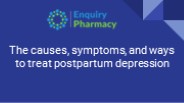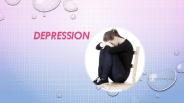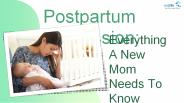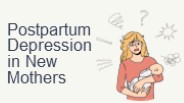Postpartum Depression Symptoms PowerPoint PPT Presentations
All Time
Recommended
There is no doubt that becoming a mother is one of the most loved and special feelings experienced by women, but it can also be a challenging and overwhelming time for some mothers. The overwhelming emotions of motherhood that wash over them are not tears of happiness but of a different kind of storm – postpartum depression (PPD). This often misunderstood condition is far from the fleeting "baby blues," and affects up to 1 in 7 mothers. It has a prevalence between 5% and 60.8% worldwide.
| PowerPoint PPT presentation | free to download
Bringing a child into the world is undoubtedly a joyful and emotional experience. However, for some new mothers, the period following childbirth can be characterised by a deep sense of melancholy and helplessness. Postpartum depression (PPD) is the term for this. The health of the mother and the functioning of the family as a whole are both significantly impacted by this condition, which affects many women worldwide. We will examine the causes, signs, risk factors, potential side effects, and therapies for postpartum depression in this thorough article, putting light on a mental health problem that is frequently misunderstood and disregarded.
| PowerPoint PPT presentation | free to download
50-75 percent of all new mothers experience these feelings of sadness ... If left untreated, tragic outcomes could prevail for the babies and their mothers. ...
| PowerPoint PPT presentation | free to view
An evaluation of the Edinburgh Postnatal Depression Scale in ... available to these clients Barriers to mental health care Methods Edinburgh Postnatal ...
| PowerPoint PPT presentation | free to view
Reflect Within fosters understanding of Postpartum Depression through compassionate support and education.
| PowerPoint PPT presentation | free to download
... Future Postpartum Psychosis Postpartum ... MN Barriers to Detection Women will present themselves as well as they are ... Obstetrics, Family Practice ...
| PowerPoint PPT presentation | free to view
Postpartum Depression By: Stacie Burton Baby Blues Occur in 50% to 75% of new mothers Lasts from a few hours to a week or two Generally will peak on the 5th ...
| PowerPoint PPT presentation | free to view
Postpartum Depression Burden Approximately 500,000 of the 4 million American women giving birth each year experience postpartum depression (PPD) PPD is under detected ...
| PowerPoint PPT presentation | free to view
... by: Leanne Haddad, Vanessa Gabrielson, Carol Williams, Amy Kiley, and Tamara Plog ... Postpartum depression is a mood disorder with feelings of ...
| PowerPoint PPT presentation | free to view
In the United States, depression is the leading cause of non-obstetric ... Physicians/Nurses: Obstetrics, Family Practice, Pediatrics. Case Managers/Social Workers ...
| PowerPoint PPT presentation | free to view
Highest concentrations found in 'hind' milk 8 hours after maternal dose. ... Greatest in hind milk. No detectable concentrations of paroxetine found in infant sera ...
| PowerPoint PPT presentation | free to view
Read this article to understand the causes, symptoms & treatment methods of postpartum complications. Preserve your baby's stem cells and protect your family's health. Visit https://www.cordlifeindia.com/why-save-cord-blood
| PowerPoint PPT presentation | free to download
Unlocking the healing paths for postpartum depression requires exploring innovative treatments like ketamine therapy. While more research is needed to fully understand its role and long-term effects, ketamine offers a promising avenue for rapid relief from depressive symptoms in new mothers, paving the way for improved maternal mental health and well-being.
| PowerPoint PPT presentation | free to download
There is a lot of danger for the baby and the mother when postpartum depression is not cared for but there are a few treatment options to fall back on if needed. According to the CDC, around 20 percent of new moms are affected with this type of depression and will need help dealing with it. http://bonus.clickmeter.com/postpartum
| PowerPoint PPT presentation | free to download
Depression (major depressive disorder) is A common and serious medical illness. That negatively affects how you feel, the way you think and how you act. Fortunately, it is also treatable. Depression causes feelings of sadness and / or A loss of interest in activities once enjoyed. It can lead to a variety of emotional and physical problems and can decrease a person’s ability to function at work and at home. According to the world health organization (who), depression is the most common illness worldwide and the leading cause of disability.
| PowerPoint PPT presentation | free to download
... husband will change from being a romantic bond to include a working partnership ... Some women are unprepared for these losses and for the amount and type of work ...
| PowerPoint PPT presentation | free to view
Rise in number of childbirths is a key factor driving postpartum depression market revenue growth
| PowerPoint PPT presentation | free to download
Onset at 3rd or 4th day post-delivery and can last from a few days to a few weeks ... 20-60 mg/d, citalopram (Celexa) 20-60 mg/d, or escitalopram (Lexapro) 10-20 mg/d ...
| PowerPoint PPT presentation | free to view
Read this informative article to you know everything a new mom needs to know about Postpartum Depression. Visit https://www.cordlifeindia.com/why-save-cord-blood to know the benefits of stem cells banking.
| PowerPoint PPT presentation | free to download
to suicidal ideation. to psychotic depression. DURATION OF SYMPTOMS. Untreated, symptoms can last: ... serious suicidal/homicidal ideation should be referred ...
| PowerPoint PPT presentation | free to view
Depression is a mood disorder and serious medical illness that negatively affects how you feel, think, and act, including a persistent sense of sadness and loss of interest.
| PowerPoint PPT presentation | free to download
Depression in Women: From PMS to Postpartum Blue
- Depression in Women: From PMS to Postpartum Blues
Depression in Women: From PMS to Postpartum Blues
| PowerPoint PPT presentation | free to view
To assess prevalence of postpartum depression (PPD) among postpartum mothers in ... 10% of these women develop a longer-lasting depression ...
| PowerPoint PPT presentation | free to view
'I want them [husbands] to go to a class that's called What the Hell's Wrong With My Wife? ... I was feeding the baby in the kitchen and I just said- I have to ...
| PowerPoint PPT presentation | free to view
METHOD: Women with post-partum depression (n=193) were assigned randomly to routine primary care, non ... compared with usual postpartum care, ...
| PowerPoint PPT presentation | free to download
Data was obtained from RI's Pregnancy Risk Assessment Monitoring System (PRAMS) ... Unintended pregnancy: 36% Variable: Fussy Baby ...
| PowerPoint PPT presentation | free to view
24% of all Utah women who delivered a live birth reported feeling moderately ... http://www.obgyn.net/female/patient/default.asp?page=leopold on October 25, 2006. ...
| PowerPoint PPT presentation | free to view
Women at risk of both sub-clinical and major postpartum depression can be ... of Health Research Training Program in Genetics, Child Development and Health ...
| PowerPoint PPT presentation | free to view
increasing depression Clinical Symptoms Marked apathy and anhedonia Early morning awakening 11 pound weight gain Suicidal ideas Fatigue Social withdrawal ...
| PowerPoint PPT presentation | free to download
... Century Gothic Wingdings 2 Verdana Calibri Wingdings Verve 1_Verve 2_Verve 3_Verve 4_Verve 5_Verve 6_Verve Depression & Anxiety in Women ...
| PowerPoint PPT presentation | free to view
Clinical diagnosis of a depression at a low or sad state marked by significant ... Saint-John's Wort flower. Things I shall look in details: - Mechanism of the drug ...
| PowerPoint PPT presentation | free to view
Understand the signs of depression after childbirth, including persistent sadness and withdrawal from social interactions. Recognizing these signs is vital for new mothers. Visit Exams4sure for additional insights.
| PowerPoint PPT presentation | free to download
I am full of cancer Depression Model and Theories Unified Model of Mood Disorders Genetic Vulnerability Developmental Events Physiological Stressors ...
| PowerPoint PPT presentation | free to view
Although the various types of depression are quite distinct, they all share a ... grand schemes that might range from unwise business decisions to romantic sprees. ...
| PowerPoint PPT presentation | free to view
The diagnosis has been shown to be missed by primary care physicians 50-80% of the time ... The Diagnosis of Major Depression ...
| PowerPoint PPT presentation | free to view
Depression affects at least one out of every 8 Americans during some time of ... Deep brain stimulation * Postpartum depression versus baby blues Premenstrual ...
| PowerPoint PPT presentation | free to view
Maternal depression and child development Pediatric Child Health Thank You Thank You * Women who have experienced postpartum depression have a 50% to 62% risk for ...
| PowerPoint PPT presentation | free to download
Want to know what are the symptoms, causes, types and treatments of depression? For more information about depression, you can visit our health blog YourHealthisPrecious.com. http://www.yourhealthisprecious.com/depression-awareness-signs-causes-types-treatments/
| PowerPoint PPT presentation | free to download
Disturbed mother-infant relationship (elevated cortisol found in both) ... From 'Down Came the Rain: My Journey Through Postpartum Depression (Brooke Shields ...
| PowerPoint PPT presentation | free to view
Depression is a medical condition that affects your mood and ability to function. Most people think it just feeling sad and associate it with the Monday blues, but depression is very real and usually not very short-lived. Its types include clinical depression, bipolar depression, dysthymia, seasonal affective disorder, and others. Some of the treatment options range from counselling to medications, to brain stimulation as well as complementary therapies.
| PowerPoint PPT presentation | free to download
Postpartum Complications Postpartum Complications: Principles The most frequent cause of postpartum hemorrhage is uterine atony. Anything that overdistends the uterus ...
| PowerPoint PPT presentation | free to view
What are the risks to children when postpartum depression goes untreated? Children of mothers with untreated depression exhibit. More fussiness and colic
| PowerPoint PPT presentation | free to download
Perinatal Depression
| PowerPoint PPT presentation | free to view
... work exceeded 1 year, up to 18 months. POSTPARTUM DEPRESSION: ... FEELING 'SPEEDED UP', DECREASED NEED TO SLEEP, DISTRACTIBILTY, IRRITABILITY, EXCITABILITY ...
| PowerPoint PPT presentation | free to view
Depression is a serious state that can affect your social life, relationships, career, and sense of self-importance. And for women in particular, depression is very common.
| PowerPoint PPT presentation | free to download
MAJOR CAUSES: uterine atony, laceration of vagina, cervix, perineum, and ... EARLY PP HEMORRHAGE-1ST 24 HR CAUSED BY UTERINE ATONY & LACERATION ...
| PowerPoint PPT presentation | free to view
Depression During Pregnancy Kathleen S. Peindl, M.S., Ph.D. Associate Professor in Psychiatry Thomas Jefferson University Philadelphia, PA 19107 Depression During ...
| PowerPoint PPT presentation | free to download
2. In mare, the initial injury in perforation of the vaginal roof ... Epidural Anesthesia, Ice packs in case of laminitis in mare ...
| PowerPoint PPT presentation | free to view
Wide mood swings. Occasional negative thoughts. Primary Treatment: ... Dysphoric mood. Postpartum Depression. Difficulty concentrating or making decisions ...
| PowerPoint PPT presentation | free to view
Difficulty breast-feeding. Exhaustion. Financial problems. A lack of support ... A mother's ability to breast-feed can be challenged while being treated for ...
| PowerPoint PPT presentation | free to download
Identify what depression is, as well as its many forms. ... Indecision, lack of concentration or forgetfulness. Poor self-esteem or guilt ...
| PowerPoint PPT presentation | free to download
Depression in Pregnancy. Angela Bowen, RN PhD (Cand.) Community Health and Epidemiology ... head circumference (Chung, 2001; Murray, 2003) Effects on babies...
| PowerPoint PPT presentation | free to view
Normal adaptive response to a loss of a valued object or ... LEXAPRO (escitalopram) SSRI'S. Block the reuptake of serotonin (5-HT), allowing serotonin to act ...
| PowerPoint PPT presentation | free to view
3 X common in teenage parents(Hall ... Puerperal Psychosis. Onset in first 2 w. More severe and rare illness ... Women at risk of BAD/Puerperal psychosis should ...
| PowerPoint PPT presentation | free to view
... effectiveness is more likely to be due to the effect of radiant heat or massage. ... Two trials compared pre-prostate surgery pelvic floor muscle training with ...
| PowerPoint PPT presentation | free to view
Introduction: Welcoming a new baby into the world is undoubtedly one of life's greatest joys. However, amidst the excitement and wonder, many new mothers experience a range of emotions that can be overwhelming. From hormonal fluctuations to sleep deprivation and the demands of caring for a newborn.
| PowerPoint PPT presentation | free to download
























































